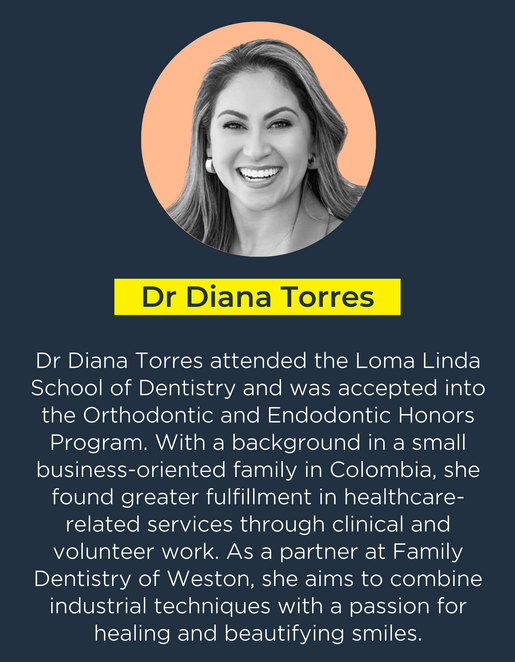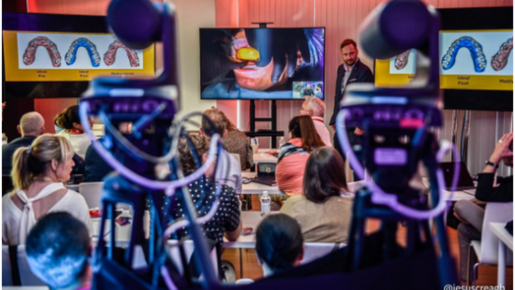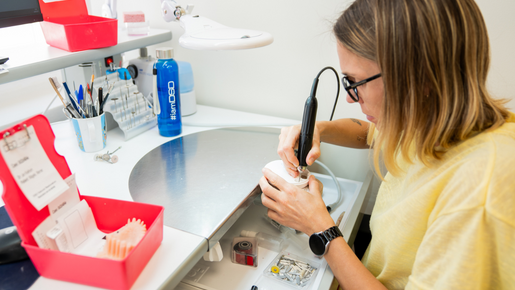In the latest episode of the Smile Business Diaries podcast, Maria Cabanellas chatted with Dr Diana Torres, partner at Family Dentistry of Weston, about her path in dentistry and her practice. Among other topics, they discussed the transformation of her dental office from high-volume, insurance-driven operations to a more patient-centric model emphasizing quality and personal connections.
“What I started realizing is that I had time to then talk to patients, you know, and then I started asking people: ‘Will you do me a favor? Will you allow me to give you options? Will you allow me to sit down and discuss? Maybe more things are going on in your mouth that I probably missed a couple of years ago.’
I've been blessed with patients that have been coming to my practice for over 20 years. Great reputation, great location, Western Florida is the family-oriented location (...) So family dentistry was still there. That environment, I still wanted it to grow. But then I wanted to do more comprehensive, more loving, more time, more connections, and of course the dentistry that came with it.”
Surrounding herself with mentors like Karla Soto and Christian Coachman helped shift her mindset towards this new practice vision:
“Most of what I got from my mentors - I consider Karla (Soto) a mentor, Christian - you listen to all of them and you constantly are surrounded by them and their courses. Your mindset starts changing, right? And you're like, okay, how can I do this better? So I'm like, I need to start leaving the insurance mindset behind. I need to start creating a better environment for me and my team.”
What advice would she give to a dentist looking to move away from insurance-based practice?
“Investing in yourself, surround yourself with the right mentors and then you know find the team and create the culture that can propel that vision that you have in mind because at the end of the day it helps, all of the pieces. You know, I got this from Christian, if the team doesn't see it for themselves they won't care, right, they’ll be like ‘This is for you, this is your dream’, right? I needed to help my team see what was in it for them.”
Listen to the episode in full
Listen to the full episode now on Spotify, Apple Podcasts or YouTube to hear more about Dr Diana Torres’ story and practice life. You can also read the full transcript below.
About the episode guest

This transcript has been reviewed by AI and may contain inaccuracies
Maria Cabanellas: This is Smile Business Diaries, a DSD podcast. In today's episode of Smile Business Diaries, I have a fascinating conversation with Dr. Diana Torres. She takes me through her journey of clinic ownership, uncovering all the big decisions she's had to make and how they've paid off. Let's begin.
After earning her bachelor's degree in biomedical and physical science from the University of Central Florida, Dr. Diana Torres attended the Loma Linda School of Dentistry and was accepted into the orthodontic and endodontic honors program. With a background in a small business-oriented family in Colombia, she found greater fulfillment in healthcare-related services through clinical and volunteer work. As a partner at the Family Dentistry of Weston, she aims to combine industrial techniques with a passion for healing and beautifying smiles. Dr. Torres provides comprehensive dentistry incorporating orthodontics with Invisalign, performing root canals, and offering cosmetic options.
Inspired to be a leader in the community, Dr. Torres focuses on meaningful research, clinical excellence, and extensive community service, volunteering at the Mission Dental Clinic in Delray Beach and participating in international mission trips to Nicaragua and Kenya. Welcome, Dr. Torres. How are you?
Dr. Diana Torres: Thank you so much for having me! This is so exciting. What a cool way to just, you know, spend some time with each other.
Maria Cabanellas: Absolutely! I'm really excited for this conversation because I feel like you have grown so much in such a short period of time, and it's phenomenal, you know, just your energy, your spirit, your story, really—you know, you're in it, I think still, right? I can say you're still participating in your journey to success and transitioning your office in certain ways. So, please start us off by explaining what has been your journey in dentistry and what is your office like right now.
Dr. Diana Torres: Thank you for that great intro! I'm originally from Colombia. I came to the States when I was about 18, and I quickly found myself in dentistry as a dental assistant, and that’s how I got started in dentistry. While going through dental school, I quickly found out that comprehensive dentistry was the way to go, but you still don't have a clear path, right? Everything seems so basic after dental school. I was very lucky to find people like Karla Soto and the team at DSD who showed me another path where I could start living life and enjoying dentistry. I took that upon myself after most of you guys showed me a good pathway to follow into modern dentistry and transition my practice from a fully insurance-driven practice to now taking some PPOs, focusing on quality, technology, and spending time with patients. I create connections; I’m a people's person, and I love that I get to sit down with people and just connect with them, and of course, do their dentistry right. But you know, my days just go much smoother than before, for sure.
Maria Cabanellas: Well, definitely, and that's amazing to hear because I think that's the dream, right? To be insurance-free, not relying on those insurance patients. And I'm sure we're going to get into that more, but can you explain to us what your practice is like, where it’s located, what’s your patient type, and how do you practice?
Dr. Diana Torres: I’m in Florida, located in Weston. I’ve been in my practice for five years, and during that time, it’s evolved. I do all kinds of cosmetic dentistry, focusing a lot on pre-restorative orthodontics. I love and enjoy doing Invisalign to get my cosmetic cases on a roll. That allows me to be more conservative, to plan my cases better. It’s still a family dentistry kind of practice, but it has evolved into a more cosmetic practice with a focus on functional and conservative dentistry. I’d describe it as “loving, artful dentistry” because I get to love my patients, craft my art, and in the last months, I’ve been perfecting my techniques. My practice has definitely evolved tremendously in the last year.
Maria Cabanellas: Giving perspective, five years—I think it’s safe to say you’re still a new business owner, right? I mean, that’s a short window of time if you think about it, and to be able to say, “I got this practice full of insurance-based patients, and now we’re nearly almost insurance-free.” Let’s talk about that, let’s dive into it because that’s what people want to know about. You’re in it right now. How has that experience been, inheriting this practice and the transition process?
Dr. Diana Torres: I had a great transition process with the previous owner, and it was a heavily insurance-driven practice, mostly PPO. We didn’t even have a hygienist, so one of my first steps was to implement a strong hygiene program, which could help educate our patients on more than just single-tooth dentistry and managing emergencies. The hygiene department started growing, and after the previous owner retired in 2021, I found myself very busy—too busy, really. I had three hygienists, I was the only doctor, and I was exhausted, trying to balance everything, including being a mom. I felt burnt out. I was working five days a week, even adding Fridays, but it just wasn’t sustainable.
I realized that this wasn’t the way I wanted to practice dentistry or live my life. I started investing in myself, creating a mindset shift, and surrounding myself with mentors like Carla and Christian who helped me see a better way. I began the process of leaving the insurance mindset behind and creating a better environment for me and my team, where we weren’t as tired and could enjoy our work more, even if it was just a single filling. Last year, I started my process with DSD, which helped me transition from single-tooth dentistry to comprehensive care. It allowed me to look at the mouth differently, to create a path toward modern dentistry with better technology, quality care, and a focus on patient experience.
With that, it became easier to start thinking that some of these insurances weren’t worth it. This year, I was able to drop two of the biggest ones, MetLife and Delta. The transition was hard—I’m not going to lie. At the beginning of this year, we went from having all our chairs filled to feeling like a ghost town. But that’s normal. I realized I had time to talk to patients, to ask them if they’d let me give them options, to discuss more things going on in their mouths that I might have missed in the past. I’ve been blessed with patients who have been coming to the practice for over 20 years, and we’re in a great location in Weston, a family-oriented area with lots of families moving in. Family dentistry is still part of the environment, but now we’re more focused on comprehensive, loving, and artistic dentistry. We don’t see as many patients as before, but the quality of care has improved significantly.
Maria Cabanellas: And how has that affected you? What has been the greatest impact for you out of this transition?
Dr. Diana Torres: The greatest impact has been on my team. Creating a team culture is hard. Sometimes I feel like my team is strong, then one person leaves, and it feels like things fall apart. But this past year, I’ve been able to coach and bring in people who align with our vision, and they’re staying strong. They’re starting to see the vision, to enjoy what they do. The impact has been on the team because, no matter what, sometimes even when I doubt myself, they keep me on track.
I used to worry about seeing as many patients as possible, but now, we’re leaving at 5:00 p.m. I tell my team, “Guys, it’s 5:15, go home to your kids. We’re done. We had fun today.” The patient experience has changed too. Patients are noticing how the practice has evolved. Some patients even come in to sit in our reception area, have coffee, and work on their computers because they find it a better place. The patient experience has become more enjoyable, and we’re all happier. I’ve been able to retain the key people in my office, and with that, the patients feel the difference.
Maria Cabanellas: Do you feel like there’s a big fear of going through this transition of eliminating insurance from the practice? What were your greatest fears, and how did you talk yourself out of stopping before you even got started?
Dr. Diana Torres: Mindset. I can hear both Carla and Christian saying, “Mindset, mindset, stay strong.” It’s about creating a better way to do dentistry and a better life. My husband was a huge supporter—he knew how hard I was working and how exhausted I was. My greatest concern was whether I’d be able to support my team with the overhead, seeing fewer patients. But when I looked at the bottom line, I realized that even though I was seeing a lot of patients, my profits weren’t as high as I thought. It was a revelation. Now, we’re at the same or even better profit levels, but with less stress and more fulfillment.
Maria Cabanellas: Was that a revelation that came over time?
Dr. Diana Torres: Totally. The first few months were hard, but as I started having more time to talk to patients, I realized I didn’t have to see everybody. I didn’t have to help every single patient who came into my practice, especially if they didn’t value dentistry the way I did. Changing that mindset in myself and the team was a constant struggle, but now they’re on board. They’ve seen the difference. It’s much more enjoyable to see fewer patients and provide better care. It’s about quality over quantity.
Maria Cabanellas: That’s amazing! I’m just taking a quick break from this podcast interview to tell you how you can get started with DSD. If there was anything that our guest has mentioned that strikes a chord with you or if you’re curious about becoming a DSD Clinic, I encourage you to book a call with me. This is a 30-minute, no-obligation information-sharing session in which I can answer your questions about DSD and discuss your options based on your unique circumstances. The link to schedule a call with me can be found in the notes on this episode. Now back to the interview.
What was I going to ask you? Oh, so the transition—how did the existing patients react? How did you have that conversation with them? I think that’s another fear from offices—upsetting existing patients by changing things up on them. It’s almost like you’re working for the patient at that point, and they’re dictating your livelihood and what you do in your practice. So, what did you do in that situation?
Dr. Diana Torres: The biggest thing was preparing. I worked with a company to help with the transition, and it’s been going on for a year or two. It’s a long process with insurances—negotiating fee schedules and then dropping out of some insurances. We started preparing by sending messages and emails to patients, explaining what out-of-network, non-restricted providers do and how I could still take care of them in my practice. It was all about the patient and not being restricted by insurance dictating what was best for them.
We created a message, emailed our existing patients, and started preparing them. The team was the biggest challenge. They had to change how they communicated with patients, explaining that we don’t take insurance but that we love to have them. It was about connecting with the patient from the phone call. We sent letters to patients about the change, and as they came in, we reminded them. Some forgot about it, but when they came in, we explained it again. Some patients understood and appreciated the change, while others decided to leave, which was okay. Some have even come back, realizing the value we provide.
Maria Cabanellas: That’s a great filtering technique—identifying who’s there for the right reasons and who values the care you provide. It’s important to focus on patients who understand the overall health benefits and the type of dentistry you’re doing to help them.
Dr. Diana Torres: Absolutely. The key is getting the team to see the value of what we do. It’s not just about the dentist; it’s about the entire practice and the impact we have on people’s lives. It’s about creating a positive environment where everyone feels good about what they’re doing.
Maria Cabanellas: And that’s amazing. You’ve had a lot of transitions, not just with the insurance. Your mindset has clearly shifted, and you mentioned Carla Soares and Christian Coachman as big mentors or influences for you. What were the top moments or decisions that helped you pivot and go in this new direction?
Dr. Diana Torres: I’m a mom and a wife, and I wanted to do life and dentistry at the same time and enjoy it. I wanted to feel fulfilled when I left my practice. One of the most impactful moments was when we started doing comprehensive dentistry. After a long day of working on one full-mouth patient, my team was dancing at the end of the day. It was a hard day, but we were all cleaning up, playing music, and having fun. That’s when I realized we were on the right path.
The other key was investing in myself and surrounding myself with great mentors. I found people like Dr. Galler and Carla who showed me a different way to practice dentistry, a way that aligned with the lifestyle I wanted. I wanted more time with my kids, to be home at a decent time, and to have a better work-life balance. The mindset shift was crucial—surrounding myself with the right people, investing in the kind of dentistry I wanted to provide, and creating a culture in my practice that supports that vision.
Maria Cabanellas: That’s such great advice—surrounding yourself with the right people, investing in yourself, and creating a strong culture. It’s clear that your journey has been transformative. Has there been anything you would have done differently or any regrets along the way?
Dr. Diana Torres: There are always things you could do differently, but I don’t have any major regrets. If I were to start a second practice, I’d have a better idea of what to prioritize, like building a strong team from the beginning. I’d focus on creating a strong culture quickly because that translates to the patients. I wouldn’t waste time on things that don’t align with my vision. If I were to bring an associate into my practice, I wouldn’t even let them deal with insurances. I’ve learned that letting go of team members who don’t align with the vision is important. It’s hard to let go, but it’s necessary for growth.
Maria Cabanellas: That’s such an important point—letting go of people who don’t fit the vision. It’s not about people-pleasing; it’s about finding the right fit for your practice and your team.
Dr. Diana Torres: Absolutely. Letting go is hard, but it’s necessary. When someone doesn’t fit the vision, it’s better for everyone involved to move on. It’s about finding a happy place for everyone, where they can thrive.
Maria Cabanellas: And you’ve done an amazing job transitioning your practice from an old traditional model to a modern, insurance-free practice. It’s truly inspiring. Thank you for sharing your journey with us, for being part of the DSD network, and for your contribution to the dental community. It’s been wonderful talking to you.
Dr. Diana Torres: Thank you so much! It’s been fun. I’m still on my path to doing better dentistry and having a better life with dentistry, but I love that I get to share my journey. I still have a long way to go, but I’m surrounded by great people who are helping me along the way.
Maria Cabanellas: It’s amazing to see your progress, and I’m sure our listeners will take away a lot from your story. Thank you for being part of this series, and we look forward to hearing more from you in the future.
Dr. Diana Torres: Thank you, Maria. I’d love to continue sharing and being part of this journey. If anyone wants to reach out to me, they can email me at DrDianaTorres@gmail.com or find me on Instagram at @DrDianaTorres. My practice, Artful Dentistry in Weston, is also a great way to connect. I’m always happy to share what I know, even though I still have a lot to learn.
Maria Cabanellas: Thank you for listening. If you enjoyed this episode as much as I did, be sure to like and share it with your professional network. In the next episode, I talk to Dr. Ramin Tabib. If you subscribe to Smile Business Diaries, you won’t miss it.



